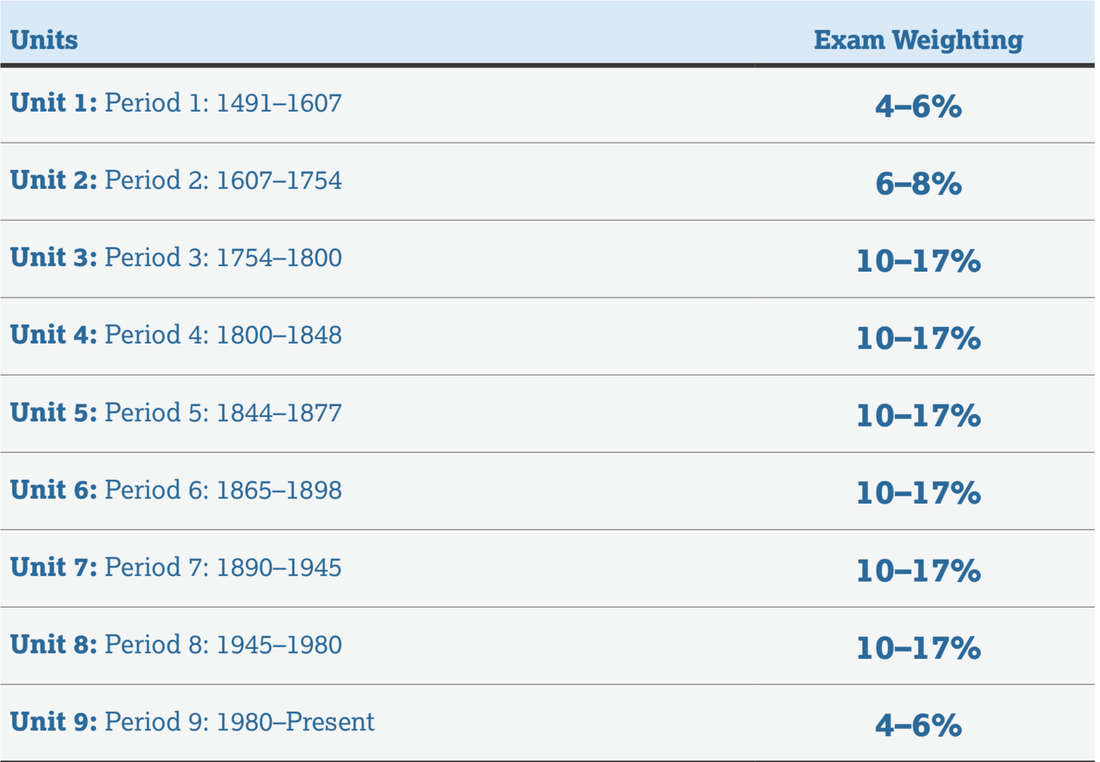|
The first page of your binder should be the student letter (below) printed out and signed by your guardian.
For quarterly assignments, hover over APUSH I at left
|
Course Description: The Honors 1 /AP track U.S. History course is designed to prepare students AP US History, the equivalent of an introductory college or university U.S. history course. Students investigate significant events, individuals, developments, and processes in historical periods 1 trough 5 from approximately 1491 to 1890. Students develop and use the same skills, practices, and methods employed by historians: analyzing primary and secondary sources; making historical comparisons; utilizing reasoning about contextualization, causation, and continuity and change over time; while developing historical arguments. The course also provides seven themes that students explore throughout the course in order to make connections among historical developments in different times and places: American and national identity; migration and settlement; politics and power; work, exchange, and technology; America in the world; geography and the environment; and culture and society.
| ||||||
What should I have learned by the end of APUSH 1?
- Pre-Columbian Societies
- Transatlantic Encounters and Colonial Beginnings, 1492-1690
- Colonial North America, 1690-1754
- The American Revolutionary Era, 1754-1789
- The Early Republic, 1789-1815
- Transformation of the Economy and Society in Antebellum America
- The Transformation of Politics in Antebellum America
- Religion, Reform, and Renaissance in Antebellum America
- Territorial Expansion and Manifest Destiny
- The Crisis of the Union
- Civil War
- Reconstruction
- The Origins of the New South
- Development of the West in the Late 19th Century
How Much of each time period should I know?
Honors US History covers Period 1 through 5
By the end of your SECOND year, you should be up to period 9
The test questions are broken down as follows:
By the end of your SECOND year, you should be up to period 9
The test questions are broken down as follows:
This class will require you to think like a successful student.
I will not "Spoon feed" information to you as I do in typical classes. You should always remember 2 rules:
Tuttle's rule #1
A teacher should give 60% of the instructions needed to carry out an assignment. The Student needs to work out the other 40%
TUttle's rule #2
If you are unsure of the directions, do the assignment you think it should have been.
Dear Students (and Parents),
Welcome to Honors US History! This is an Advanced Placement track course, which means that if you succeed in this class, you will be invited to go on the Advanced Placement US History (APUSH). There are some key things that you need to know in order to succeed in my classroom this year.
We will be doing a lot of reading at home for this class. My advice to you is to EMBRACE IT! You will do well in life and in this course if you learn to love reading and do not treat it as a chore. Put your phone in sleep mode an hour before you go to bed and keep some reading material (it doesn't have to be history) on your bed table. You will sleep better and you will soon cherish that time where no one is texting you!
You will need a one and one-half-inch binder dedicated to this class. It will be difficult to pass this class without it. I expect you to keep all assignments organized in your binder according to due dates. In other words, don't throw anything away. At the end of each marking period you will receive a test grade for your binder (if you keep your assignments and take notes it is an easy A to average into your grade). You should regularly check Google Classroom for assignments and keep a schedule to pace yourself. All assignments should be handed in on-time to receive credit. Late work will not be graded for credit.
Because of Covid19, we will rely heavily on ONLINE or HYBRID learning. That means you may not have access to your locker or will be working from home. I strongly encourage you to make a Google Folder for Honors US I since Google Classroom will only hold your assignments. This way, you can store digital notes and materials and never lose them. I would also encourage the storing of passwords for online platforms or listing each of the digital resources we will be using so that you can keep track and this way we don't have to keep resetting accounts for you.
You do not ever need to bring your book to class; I keep a class set. So, binder and pen are all you need. That said, please frequently read and be familiar with your textbook. You may explore future chapters and review one’s we’ve covered already. History is not just one event happening after another- it’s all connected! You are also encouraged to watch The History Channel, You-Tube History Videos, and history oriented movies.
In an Honors/AP Class, there is often greater pressure to perform. I want to let you know that our classroom is a safe place to make mistakes. I promise you, if you follow my instructions and do your best, you will do well in our class. There is never a reason to “Copy and Paste” a response. I reserve the right to run any assignment responses through TURNITIN.COM. Also, although working together is a great way to increase your understanding and benefit from each other’s academic strengths, two people should never turn in the same response for their work. Two responses with identical or near identical responses will be considered the product of cheating. Please see my website to review our policy on academic integrity.
Finally, communication is very important to being a successful student in my class. If you are sick, have a special situation that will interfere with your work, or are feeling overwhelmed by the class, please see me privately during my office hours or email me to set up a screen chat. Self-advocating properly is a skill that will serve you well in life!
Please see your class webpage for more information.
I'm looking forward to a great year of Honors U.S. History with you!
Sincerely,
Michael Tuttle
Teacher of AP History and Sociology
[email protected]
| ushc_2.1_-_us_history_eoc_review_guide.pdf | |
| File Size: | 701 kb |
| File Type: | |
| ushc_2.2_-_us_history_eoc_review_guide.pdf | |
| File Size: | 765 kb |
| File Type: | |
| ushc_2.3___2.4_-_us_history_eoc_review_guide.pdf | |
| File Size: | 491 kb |
| File Type: | |
| ushc_3.1_-_us_history_eoc_review_guide.pdf | |
| File Size: | 631 kb |
| File Type: | |
| ushc_3.2_-_us_history_eoc_review_guide.pdf | |
| File Size: | 471 kb |
| File Type: | |
| ushc_3.3_-_us_history_eoc_review_guide.pdf | |
| File Size: | 469 kb |
| File Type: | |
|
| ||||||||||||
| ushc_3.5_-_us_history_eoc_review_guide.pdf | |
| File Size: | 501 kb |
| File Type: | |
|
| ||||||||||||
|
| ||||||||||||
|
| ||||||||||||
|
| ||||||||||||
| |||||||


